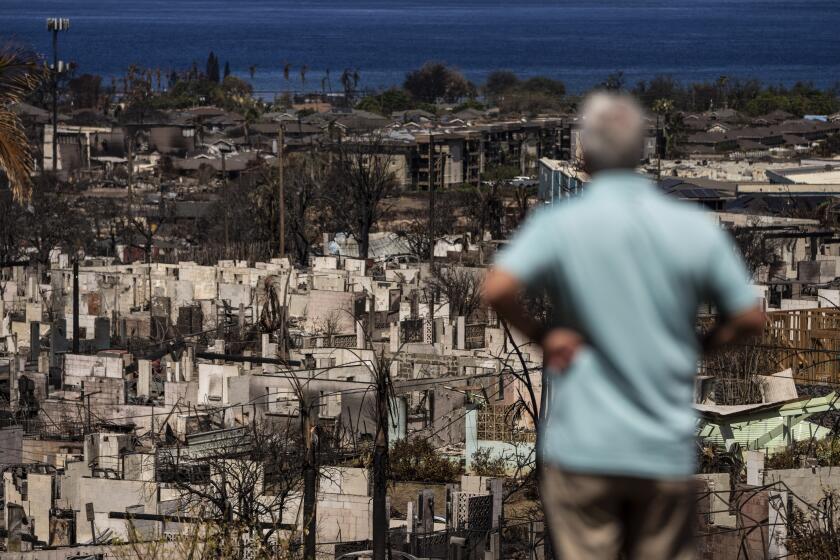Enduring Gratitude
It has been almost 80 years since the soldiers of America’s celebrated Rainbow Division departed Neuviller les Badonviller, leaving behind a tiny, war-scarred village where grateful residents still recount their heroics on the battlefields of northern France.
Now, the legends have come to life, in the form of U.S. Army Lt.--retired--Paul Jarrett.
A World War I veteran who earned a Purple Heart battling the Germans in the trenches of Neuviller les Badonviller in 1918, Jarrett returned anonymously to visit the small town seven years ago, and left a hero.
Later this month, at the prodding of residents and the town council, the San Fernando Valley centenarian will be honored locally for his military service with France’s highest award--the National Order of the Legion of Honor.
The announcement of the award, which is conferred by the president of France, surprised and thrilled Jarrett, who celebrated his 101st birthday in June. Only a few people receive the award each year, and only rarely are foreigners honored.
“It’s not for me, I merely represent what they think about American soldiers,” he said, sitting in his small, tidy room at a Woodland Hills retirement hotel. “We happened to be in the right spot in the right time.”
There is no one left among the village’s 150 residents who can recall the fierce fighting that wracked the region, near the German border, during World War I. But the stories have been passed down through generations: how brave American soldiers fought to liberate the town during the Great War.
“In this part of France, we owe a lot to American soldiers,” said Monique Harris, a French newspaper reporter who helped coordinate the townspeople’s effort to win the Legion of Honor title of chevalier, or knight, for Jarrett.
Jarrett revisited the village in 1987, representing Rainbow Division veterans, then again in 1989 with his grandson, who was filming a documentary on his military service.
“When Paul came to visit . . . he was adopted by the whole village,” recalled Harris, who served as interpreter between Jarrett and village residents. “Everybody was kissing him, the kids were climbing on his knee. He was a hero to us.”
Jarrett had been a 21-year-old Nebraska cattleman when the United States entered the war. He enlisted in the Army in 1917, and as the nation scrambled to assemble an adequate fighting force, Jarrett wound up a lieutenant.
Seven months later, he led a battalion of the 42nd Infantry Division into combat at Brest, France.
His unit was the famed Rainbow Division, made up of National Guard companies from more than 25 states. It was named by Douglas MacArthur--the future general served in the division--because it spanned the nation like a rainbow.
Jarrett spent 19 months as a soldier in France, leading a regiment of young men from the Ohio National Guard through some of the most brutal combat the world has ever known. He spent seven months in a military hospital recovering from the effects of poison gas.
His memories are still strong. He can recite the names of men who served and died with him: the young soldier whose body he retrieved from behind enemy lines, the comrade who died of gangrene after suffering a superficial gunshot wound, the fellow lieutenant whose death he learned of only when he discovered his grave on a visit to France 70 years later.
He still remembers the ringing sound of machine-gun fire, the long days spent huddling in trenches, waiting for the cover of night to launch raids.
He also recalls the kindness of the French people.
Jarrett served as a judge-advocate for his company, hearing cases brought by villagers against his men--like the complaint that unruly soldiers broke the limbs of a farmer’s apple tree when they climbed it to pick fruit.
He visited the town nearly every day and often spent the night in villagers’ homes, which were nothing more than stone shanties built amid animal pens.
“It was strange to wake up at night and hear the sounds of a pig just the other side of the wall,” he recalled.
Jarrett said he was shocked last month to learn that he had been selected to receive the Legion of Honor.
“I have the pleasure to inform you that M. Jacques Chirac, President of the French Republic, has signed the decree concerning your nomination as Chevalier of the Legion of Honor, and it is my privilege to congratulate you warmly on this occasion,” said the letter from French Acting Consul General Philippe Vinogradoff.
Jarrett’s family--he has five children, including a daughter, Paula Jarrett Ranney of Calabasas--is planning a celebration to commemorate the award and will send a videotape of the ceremony to the town of Neuviller les Badonviller.
Upon his death, Jarrett said, he will have the medal returned to the town to be displayed as a symbol of mutual affection and respect between the old American soldier and the once-embattled French village.
The town was the site of fierce battles during both world wars, and Americans came to its rescue each time, said Harris, the French reporter.
“Before Paul came to the town, a lot of people did not remember that American soldiers had volunteered to come and fight in Europe as early as 1914,” Harris said. “Having him here was quite a historical lesson for the village, and for the whole country of France. He was on French television and it was quite a big deal.
“We owe a lot to the American soldiers, to men like Paul. This honor is the highest decoration France can give, and the town of Neuviller les Badonviller is very proud of him, like a son.”
More to Read
Start your day right
Sign up for Essential California for news, features and recommendations from the L.A. Times and beyond in your inbox six days a week.
You may occasionally receive promotional content from the Los Angeles Times.






